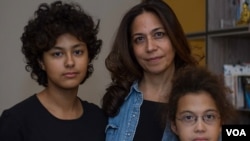It was only when Bassam’s dreams of being a pilot were crushed that the 20-year-old began to fully realize that he was a foreigner in his own country.
Born and raised in Lebanon, he is the victim of a near century-old law preventing Lebanese women who marry foreigners from passing on citizenship to their children.
The law restricts thousands like Bassam from the usual rights of statehood, cutting off access to a wide range of jobs, free healthcare and free schooling among other things, while stigmatizing entire families.
It is also a law that does not apply to men, who can pass on their citizenship regardless of whom they marry.
The citizenship issue has been thrust to the center stage of Lebanese politics in recent weeks, and growing numbers of women are demanding change to a system they consider outdated and sexist.
Second Class Citizens
Nadira Nahhas, Bassam’s mother, chose to marry someone with American citizenship.
“They [the children] are considered second class citizens and they’ve not done anything wrong,” she said. “I made the choice to be married to a foreigner, why should we be punished for it?”
Nahhas is among about 76,000 women in Lebanon whose families are impacted by the law, which was passed in 1926.
Similar citizenship laws have held sway across much of the Middle East. But as women like Nadira have stepped out from the shadows to demand reform, things have begun to change.
Saudi Arabia, Yemen and Egypt are among a handful of nations in the region that have adopted more women-friendly citizenship policies in the past decade, explained Beirut-based gender rights campaigner Lina Abou Habib.
Her organization, Collective for Research and Training on Development-Action, began a region-wide campaign for reform more than a decade ago.
Since then, some progress has been made in Lebanon. But Abou Habib maintains Lebanon’s reputation as a beacon for civil rights in the region belies the reality faced by women.
“It was wonderful to see one country after another change their nationality laws, and yet here we still have to push for a right to nationality, we are not as progressive as we claim”, she told VOA.
Sectarian Fears
Recent events have caused those campaigning on the issue to take to the streets, placards in hand, though to little effect.
Before cross-party talks covering a range of issues that took place last week, Foreign Minister Gebran Bassil, who leads Christian party The Free Patriotic Movement, refused to expand a draft law offering citizenship to the offspring of Lebanese ex-pats to include the children and spouses of Lebanese women.
Abou Habib says the talks ended with only a “vague” pledge to look into the issue.
In a recent tweet on the issue, Bassil alluded that the move would lead to Palestinians and Syrians gaining Lebanese nationality, something the Lebanese government has long sought to avoid.
He used the argument that has become the main obstacle to efforts at reforming the law: that giving citizenship to the spouses and children of Lebanese women would change the demographic in a country with a delicate, and potentially volatile, sectarian balance.
It was a claim deemed “nonsense” by Rita Chemaly of the National Commission For Lebanese Women, which has seen efforts to introduce a new law rebuffed.
“Why are Lebanese men able to give nationality to non-Lebanese women and their family if that is the case?” she asked. Chemaly nonetheless acknowledged that such fears existed within the country, and that it was the “biggest hurdle” to progress on the issue.
The number of Syrian refugees in the country, a population thought to be far higher than the official total of 1.1 million, gives further ammunition to the argument, she added.
“It is difficult to convince parliamentarians to present this law, as they are often afraid of their political parties and the allegiances of these parties,” she said.
Driven Away
Hala Bejjani, who has raised her two children in Lebanon with her French partner, sees the sectarian argument as little more than a cover for sexism.
Bejjani told VOA, “It is humiliating that Lebanese women are considered so immature and emotional that the second they get access to their rights they will be abused by someone who will come and marry them just for their nationality. It’s sexist and racist.”
Despite this, Hala remains hopeful, and welcomes recent talk of one politician potentially breaking tradition and putting a bill forward in the near future as evidence of slow, but steady, progress.
“It was a hidden problem before, people were ashamed” added Bassam’s mother Nadira. “But now it’s being talked about,” she said. People were in the dark about the issue, but now we have awareness. All we need now is the political will.”
But for Bassam, changes may come too late. Unable to pursue his ambitions in Lebanon, he wants to leave for the United States.
“I want to get the nationality,” he said, “but why should I consider myself Lebanese if they don’t consider me Lebanese?”






